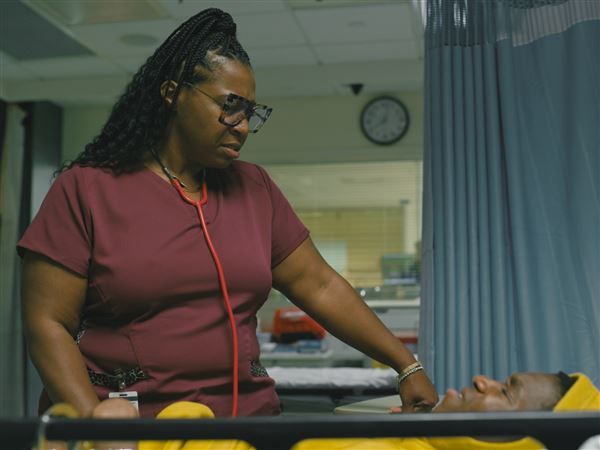As a 1980s baby, growing up with this thing we call the Internet, I became ever-more dependent on its ability to help me figure things out. Yet the idea of absorbing information from Wikipedia and Google still seems different from searching for a friend, a hookup buddy or a soulmate. Nowadays, is there a limit to what we can claim to find ourselves? Has fate been replaced by the world of online dating?
In journalist Dan Slater's "Love in the Time of Algorithms," we find ourselves learning about the "date-o-sphere," as he coins it. We enter this world of digital love, not as voyeurs into Mr. Slater's personal dating experiences, nor as students to the guidelines that will surely lead us to a successful love life. Instead, he gives us one of the first comprehensive accounts of the online dating world.
We meet and greet the faces behind the largest online dating platforms, a business that has grown into an estimated $2 billion industry, with roughly a third of all American singles perusing the Internet for non-platonic encounters. In other words, 30 million of America's 90 million singles are now open to the idea that perhaps they may not meet their next date in IRL (in real life), but instead, notice them checking-out their profile, sending a winky face, or if they're lucky, a flirtatious message.
Informative, engaging and upfront, Mr. Slater gives us a window into both perspectives -- that of the computer geeks creating "algorithms of love," and the consumers, who seem to be benefiting from them.
• • •
Between 1998 and 2005, the online dating world exploded, but Mr. Slater takes us back to the very beginning. In the early 1960s, Harvard math major Jeff Tarr and his buddy Vaughan Morrill became frustrated at the dismal prospect of meeting girls. They created Operation Match, a "matching questionnaire" that asked students to answer 75 questions about themselves and another 75 about what they sought in their "ideal date."
"LOVE IN THE TIME OF ALGORITHMS: What Technology Does to Meeting and Mating"
By Dan Slater.
Current/Penguin ($25.95).
This early version of computer dating has since evolved into more than 1,400 online dating sites. Without having to choose between a few gals or guys at a bar, online dating has created an opportunity to become extremely picky from the outset.
It seems that preferences to online dating are limitless, ranging from religion (JDate) to income (Wealthy Men or Millionaire Match) to infidelity (Ashley Madison) to international brides (Anastasia or A Foreign Affair) to size (Large and Lovely) to medical conditions (Positive Singles). We can only expect that as the online dating world becomes more popular that it will continue to become more niche. A plethora of spinoff sites and mobile applications -- from social meeting apps such as Badoo, where one can look, locate and quickly meet up with others, to hookup sites such as Grindr, for gay men, or Blendr, for straights -- has garnered an idea that it is simply up to the individual to decide what they want, how they want it and when.
Indeed, CMC (computer-mediated communication) has changed the way we meet people, from social networking sites such as Facebook to the most highly trafficked online dating sites, POF (Plenty of Fish), OKCupid, Match and eHarmony. Yet Mr. Slater explores how online dating may have also changed what we seek in others or what we are willing to consider, when faced with a limitless set of prospective mates. Whether looking for casual fun or serious commitment, the online dating world has changed -- at least for some users -- what they thought they originally wanted when they signed up for an account.
Mr. Slater allows us to make our own conclusions, but draws from a series of hypothetical and real experiences, where users met new, interesting and different people, people they may not have initially gone for in real life, but felt more open to exploring in a world of digital choices. This is what he calls the "new normal."
But it isn't only a matter of opinion. A study released in 2010 reported that one in five couples meet online. True, more people are meeting in the digital space, but this hasn't led to more coupling up. In fact, the majority of online dating executives and social scientists alike, agree that as online dating popularity has risen, so too has a decrease in commitment levels.
So much for settling, or what Mr. Slater describes as "learned helplessness." Advertising the idea that dating sites will help you find what you are after, why should anyone fear the rising divorce rate? Yet, the message also seems to imply just the opposite. Why stay, when you could just as easily find someone better?
• • •
The reality of the online dating process, though, is far from easy-peasy. As difficult as the task of meeting someone IRL, the process is even trickier when a human being is compressed into boxes: height, weight, smoker or nonsmoker, religion, career.
In Amy Webb's "Data, A Love Story: How I Gamed Online Dating to Meet My Match" (published this week by Dutton, $25.95), we come away understanding that idea in spades. Of course, she assures the reader, the ending is happy. She eventually finds the love of her life via cyber-searching, but only after a grueling period of failed attempts, weird encounters, and general confusion over how to approach JDate, a site designed for Jewish singles.
But other tales do not end with happiness or even optimism. One of the biggest threats to the online date-o-sphere is the presence of scammers, who've tricked hopeful loveseekers into sending thousands or, in some cases, hundreds of thousands of dollars for emergency accidents or for planning the first visit. And it's hard to calculate the emotional cost of false heartthrob, thinking you have found what you had been so desperately searching for.
Of course, there are books on how to deal with finding and then luring in your true love in cyberspace. Ellen Fein and Sherrie Schneider, whose 1995 "The Rules" encouraged women to be "mysterious" to catch a good man, are back with "Not Your Mother's Rules: The New Secrets for Dating" (Grand Central, $13.99), updated for the digital age. Syndicated advice columnist Harlan Cohen has done well with last year's "Getting Naked: Five Steps to Finding The Love of Your Life (While Fully Clothed and Totally Sober)" (Griffin/St. Martin's, $14.99).
But some online dating execs have jumped upon an opportunity to re-create what we seek in that special someone. Or possibly, they advocate what Jessica Massa promotes in last year's "The Gaggle: How the Guys You Know Will Help You Find the Love You Want," out in paperback next month with a new subtitle, "How to Find Love in the Post-Dating World" (S&S, $14.99). The Gaggle suggests a variety of suitors who fulfill certain needs, which helps remove the heavy weight of expectation for that special someone. (For example, one guy can be an "Ego Booster," another the "Hot Sex Prospect.")
Whether you are OK with online dating or not, Mr. Slater emphasizes that "the technology is neutral ... therefore it's only how people use it that matters." Benefiting from an extensive background in journalism, he gives us the facts, allowing us to ponder what this technology could do for us. The public skepticism, the privacy issues and the adjustment to this new age of courtship ... well, that's up for discussion on the next date.
A conversation with author Dan Slater
Dan Slater (bydanslater.com), a former legal affairs reporter for The Wall Street Journal, is a regular contributor to Fast Company magazine and publishes widely in national magazines. In 2010, he created "Long Forum" (thelongforum.com), a website showcasing "today's best long-form journalism, and asking the writers how they do it."
Fittingly, he was happy to talk about how and why he wrote "Love in the Time of Algorithms":
Evi Heilbrunn: What inspired you to write this book?
Dan Slater: I was laid off in 2009 and I became a freelancer. And so I needed stuff to write about. I had been a legal affairs reporter, [but] that was difficult to do on a freelance basis. I could have done it, but I was not committed enough ... I was sort of looking around, my layoff happened to coincide with a long-term relationship breakup. I wrote a story about the birth of the computer dating business. And that very short-story made for a launching pad about a book.
I think the book would not have happened had I not gone on the Internet myself.
EH: What was your initial reaction to the online dating world?
DS: I'm a fairly social person, but you know, it's not like dating has been easy. I have found it very difficult and you only met so many people. So I thought that was strange. I wasn't even thinking about the book then, I just cataloged it. [I thought to myself] "God, I'm just meeting a lot of people."
Once you got past its superficial stuff, "oh you've got to write a profile, isn't that weird?" Once you move past those superficial oddities, I just found that the real world implications were kind of substantial.
EH: There are many online dating books that take a first-person narrative. What compelled you to write a comprehensive work about online dating?
DS: I had no interest in writing a memoir. Not that I don't enjoy memoirs as a genre, it's very hard to write a book well regardless of what approach you take. Some of those other online dating books, some of the ones I saw, these very breezy tours through one person's experience and online dating in those kinds of books and the news media as well has been traditionally treated, as an oddity, with some kind of embarrassment. I just saw a hole, a hole in the market, for a reported book, a book that was attempting to go beyond one's experience into the wider world of online dating, both from the corporate side and the people who are running this industry, and then also from the consumer side, how is this being used? I saw a place in the market for that book.
EH: What about the issue of privacy and online dating?
DS: The privacy thing is very interesting, the way that these sites are going to improve and by that way I mean in ways that make you happy, get you what you want, by gathering information about you, by watching your behavior on the site, a lot of sites learn about you by seeing how you behave. Theoretically, it may become effective, but not only by matching you, but like what OkCupid does by reporting. Obviously, they are a great publicity, but the utopic ideal is that people will be able to read the blog [OkCupid's blog, called OkTrends] and learn more about themselves.
EH: How do you feel about the world of online dating?
DS: In general, I felt through the reporting I did, that there was a tendency to come to the technology with a lot of expectations. Online dating is merely a tool, it helps you connect with more people. It's not going to dramatically change, alter, your interpersonal abilities.
My hope with online dating, whether or not you walk away hating it, is that I was able to get an experience in the world as a result of this tool. Whether it was a good experience or bad experience, I can apply it to how I behave and improve my outlook, my happiness, my life. Online dating accomplishes that by being an antidote to loneliness. At its most fundamental, it is to make a world that is less lonely.
EH: Have you subscribed to all of the online dating sites that you write about?
DS: No.
EH: I have to ask: Are you dating anyone now and, if so, did you meet online?
DS: No, but I connected with [the woman who eventually became] my fiancee through the Facebook "People You May Know" feature.
First Published: January 27, 2013, 10:00 a.m.















